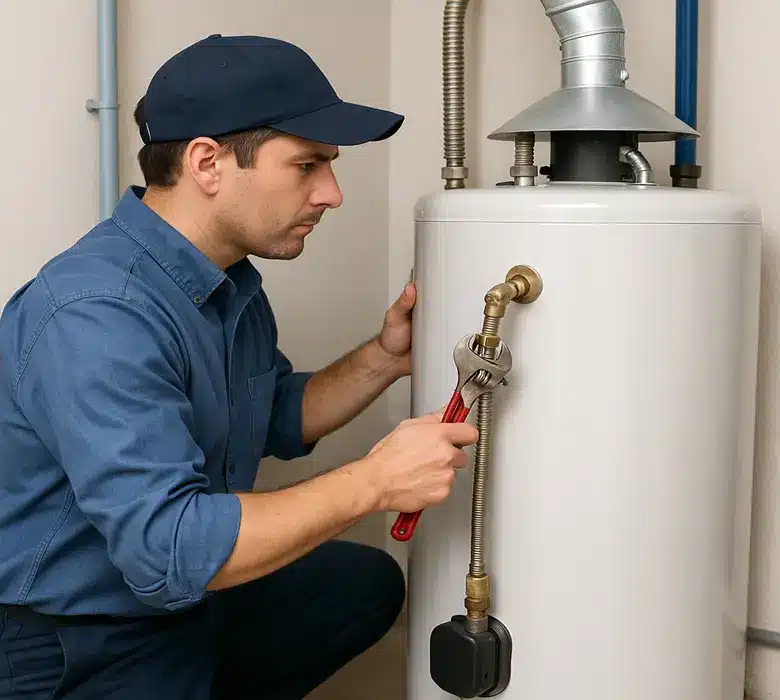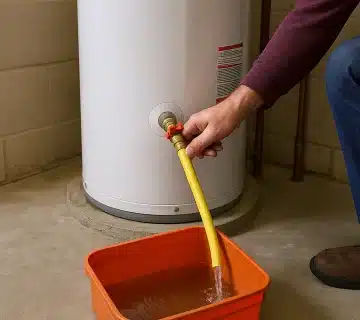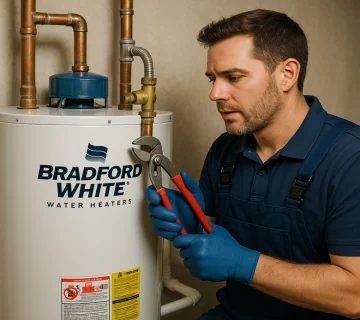Your water heater is a crucial part of your home, providing hot water for showers, laundry, and cleaning. Over time, however, every unit will fail and need replacing. So, how much does it cost to replace a water heater? On average, homeowners spend between $900 and $3,500, depending on the type, size, and installation requirements.
This guide breaks down the average cost, key factors that affect pricing, and practical tips to save money.
Average Cost to Replace a Water Heater
- Tank-Style Water Heaters
- 40–50 gallon: $900 to $2,500 installed.
- Electric models are often less expensive than gas, though efficiency varies.
- Tankless Water Heaters
- Range: $1,400 to $3,900.
- Higher initial cost but double the lifespan and lower utility bills. Tankless Water Heaters.
- Hybrid or Heat Pump Units
- $2,000 to $5,000+, depending on model and labor. Hybrid Water Heaters.
- Very efficient but require specialized installation.
Most homeowners can expect an average cost to replace a water heater of around $1,400–$1,700 for a standard unit.
7 Factors That Affect the Cost to Replace a Water Heater
- Type of Heater
- Tank, tankless, or hybrid all come with different installation needs and price tags.
- Size & Capacity
- Larger tanks cost more than smaller 30–40 gallon units.
- Fuel Source
- Electric heaters are typically cheaper to install, while gas or propane require venting and sometimes more labor.
- Installation Complexity
- Hard-to-reach spaces like attics or basements increase labor hours and costs.
- Plumbing & Electrical Upgrades
- Older homes may need pipe adjustments, rewiring, or new venting.
- Permits & Local Codes
- Permits and inspections can add $50–$500 depending on local regulations.
- Brand & Quality
- Premium models with better warranties and stronger components will cost more upfront but can last longer.
Tank vs. Tankless Cost Comparison
When weighing the cost to replace a water heater, it helps to compare tank and tankless systems. A standard 50-gallon tank might cost $1,200 installed, while a tankless could be $3,000 or more. However, tank models last 8–15 years, while tankless heaters can last 20+ years. Over time, the efficiency and longevity of tankless units may offset their higher initial cost.
How to Save on the Cost to Replace a Water Heater
- Compare multiple quotes before choosing a contractor.
- Stick to the same fuel type to avoid expensive conversions.
- Look for rebates and incentives for energy-efficient models.
- Schedule installations in off-season months when demand is lower.
- Maintain your new heater with flushing and anode rod checks to delay the next replacement.
Even the U.S. Department of Energy offers helpful advice on water heating and how to cut costs through efficiency.
FAQs: Cost to Replace a Water Heater
Q: Is it cheaper to repair or replace a water heater?
Minor repairs like replacing thermostats or heating elements cost $150–$400. But if your unit is 10+ years old and needs frequent service, replacement is usually the smarter choice.
Q: Does warranty length affect replacement cost?
Yes. Units with longer warranties often cost more upfront but save money in the long run by reducing repair and replacement needs.
Q: Can I install a water heater myself?
DIY installation is risky and may void warranties. A licensed plumber ensures code compliance, safety, and efficiency.
Q: How long will my new water heater last?
Tank models: 8–15 years. Tankless: 20+ years with proper care.
Q: Does location affect the cost to replace a water heater?
Yes. Prices vary by region due to differences in labor rates, permit fees, and availability of materials. Urban areas often have higher costs than rural locations.
Final Thoughts
So, what’s the cost to replace a water heater? Expect to spend $900–$3,500, depending on your chosen model, installation complexity, and local conditions. While tank models are cheaper upfront, tankless and hybrid systems may offer better long-term savings.
Ultimately, knowing the average cost to replace a water heater helps you plan your budget more effectively and avoid last-minute surprises. Investing in a quality unit and professional installation ensures safety, efficiency, and durability. Plus, routine maintenance like flushing and checking the anode rod can delay replacement and save you thousands over time.
By understanding the factors that influence cost, comparing quotes from trusted plumbers, and choosing the right unit for your household, you’ll keep hot water flowing reliably — without overspending.





